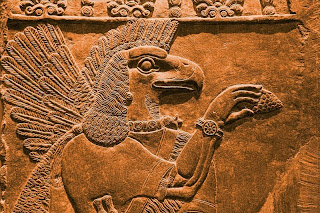Before the forerunners of modern science and objectivity, in
ancient Greek philosophy and Eastern naturalism, there was mythopoeic thought.
This was a very different way of understanding the world, some principles of
which we can glean from the ancient myths. “Mythopoeia” means myth-making, and
in modern times the word was picked up by J.R.R. Tolkein, who was interested in
the myths that express the distinctive forms of thinking associated with each
language and historical offshoot. Tolkein famously fleshed out the British
worldview with his hobbit mythos. In the 1940s, the Egyptologist Henri
Frankfort and his wife applied this word “mythopoeic” in their case for the thesis
that the ancients had a distinctive, non-modern mode of cognition.
As far as I can tell from the Frankforts’ The Intellectual Adventure of Ancient Man,
they don’t subscribe to the Enlightenment conceit that history proceeds in
progressive stages; that is, although they speak of a development from
mythopoeic thought to modernism, they don’t assume that ancient cognition is inferior
to the modern kind or that the former can be understood only with reference to
what came afterward. When we modernists do congratulate ourselves in that
fashion, we see ancient myths as just botched attempts at scientific
explanation. Auguste Comte, for example, is explicit about the teleological
assumptions of this progressive theory of history. No, in line with the 20th
C. postmodern denunciation of modernist overreach, anthropologists came to
insist on cultural relativism and on the merit of studying civilizations with a
minimum of cultural bias. Whether anthropological objectivity is possible is
another matter, but Frankfort et al,
Ernst Cassirer, Clifford Geertz and others aimed to describe how foreign
cultures work, by laying bare the internal coherence of those cultures.
Phenomenology and the Logic of Myths
Here I’d like to critique the Frankforts’ fascinating
discussion of the development of mythopoeic cognition. What, then,
distinguishes the ancient, non-modern way of understanding the world? According
to the Frankforts, the ancient Egyptians and Mesopotamians (Sumerians,
Babylonians, Assyrians, Akkadians) had little interest in explaining things in
the modern sense, although they had some conceptions of logic and of empirical
reasoning. The ancients experienced the world holistically, meaning that they
didn’t distinguish subject from object. As the Frankforts put it, borrowing
from Martin Buber, the ancients experienced the world as a Thou, not as an It. The
Frankforts distinguish this from animism, if the animist is understood as
someone who personifies inanimate things by imagining spirits being injected into
lifeless matter, since there was no process by which the ancients dissolved any
such dualism; they just experienced events as extensions of their mind, just as
they experienced themselves as extensions of the world’s volitional forces,
gods, and other spirits.











